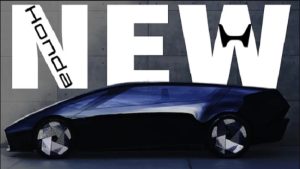Honda Motor unveiled two concept cars at the CES tech conference, providing a glimpse of the upcoming lineup of electrified vehicles set to debut in North America in 2026.
These concepts, named “Space-Hub” and “Saloon,” serve as a preview for the initial production model under the “Honda 0 Series” EV.
The development of the new series adheres to three core principles: “Thin, light, and wise.” Honda’s plan includes the introduction of the first “Honda 0 Series” model based on the Saloon concept in North America, followed by releases in various regions globally.
Honda’s Saloon Concept Channels ‘Tron’ Aesthetics

The Saloon boasts a sleek and futuristic design reminiscent of the “Tron” movies, featuring a large front-end light with neon illumination, showcasing a redesigned Honda “H” at the center.
The back mirrors the front, incorporating a substantial indented rectangular area outlined in red lighting, with the “Honda” emblem at the center.
Internally, the Saloon presents a minimalist digital cockpit, complete with a yoke steering wheel, aligning with the trends seen in concept cars unveiled at CES by other manufacturers.
Access is facilitated by a large falcon wing door that opens upward from the vehicle’s roof.
As for the Space-Hub, it takes the form of a minivan or shuttle, adopting the same design elements as the smaller Saloon but on a larger scale.
The interior maintains a similar cockpit design but offers an expansive rear area with lounge-style seating.
Honda’s 0 Series to Integrate Advanced Driver-Assist System
Honda has announced that the initial iteration of the 0 Series will incorporate an advanced driver-assistive system, leveraging technologies initially introduced in Japan.
Subsequently, the 0 Series will integrate a next-generation “automated driving” (AD) system. This upcoming system aims to extend the application of hands-off functions, catering to both expressways and surface streets.
Honda has refrained from providing detailed specifications or performance projections for the concept vehicles and forthcoming electric vehicles (EVs), except for charging estimates.
